483.
The measure
157 (= 628 / 4) - corresponding to a quarter of a
circle - was used in order to reach not only the
First Point of Aries from kotia in Ca9-9
(237) but also to reach to the beginning of the Moon
calendar from the beginning of the text:
|
Nov 21 (325) |
22 |
128 |
March 30 (89) |
43 |
|
May 22 |
23 (143) |
Sept 29 (2 * 136) |
 |
 |
 |
|
Ca3-11 |
Ca3-12 (63) |
Ca7-24 (192) |
|
kua hua |
ki te
kotiga |
te hare
pure e tagata noho ki roto |
|
BEID |
HYADUM I (63.4 = 41.4 +
22.0) |
MIMOSA |
|
348 / 2 =
174
= 6 * 29 = 236 - 62 |
|
May 13 (133) |
14 (366 + 134
= 500) |
98 |
Aug 21 (233) |
56 |
Oct 17 (290) |
|
Nov 12 |
13 (317) |
Febr 20 (51) |
April 17 (107) |
 |
 |
 |
 |
|
Ca9-8 (236) |
Ca9-9 |
Ca12-20 (336 = 4 * 84) |
Cb1-1 (393) |
|
ku tupu te
poporo |
kotia |
kua moe |
First Point of Aries |
|
314 / 2 =
157 |
SHERATAN (27.4 = 63.4 -
36.0) |
|
tagata
oho rima - ki te marama |
koia
kua oho |
ki te
marama |
kua
moe |
 |
 |
 |
 |
|
Ca6-17 (157) |
Ca6-18 |
Ca6-19 |
Ca6-20 |
|
CLOSE TO THE FULL MOON: |
|
"July 15 (196 = 157 +
39) |
16 |
17 |
Hora Iti 18 |
|
... They made camp and
rested at the Bay of
Flies for a week (etahi
pohitu). On the
eighteenth day of the
month of July (Anakena)
they went on from
Hanga Takaure. They
climbed uphill, went on,
and reached Poike.
When they arrived, they
looked around and named
(the place) Poike A
Hau Maka. They
climbed up farther to
Pua Katiki.
When they arrived there,
they looked around and
named (the place) Pua
Katiki A Hau Maka.
They came down from the
height, from the
mountain, from Pua
Katiki, and
reached Maunga Teatea.
They looked around and
gave the name Maunga
Teatea A Hau Maka.
They all descended, they
all came down from
Pua Katiki. They
reached Mahatua,
saw it, looked around,
and gave the name
Mahatua A Hau Maka.
Then they went on and
came to Taharoa.
They saw it, looked
around, and gave the
name Taharoa A Hau
Maka ... |
|
'July 29 (210 = 237 -
27) |
30 |
31 |
'Aug 1 |
|
Aug 25 (237)
Extended Net-26b (Ox)
μ Hydrae
(157.1) |
26
Maru-sha-arkat-Sharru-15
(4th Son behind the
King)
SHIR (Possessing
Luminous Rays) =
ρ
Leonis
(158.9) |
27
p Carinae (159.3) |
28
φ Hydrae (160.3) |
|
CLOSE TO THE SUN: |
|
... The
leap day was introduced
as part of the Julian
reform. The day
following the Terminalia
(February 23) was
doubled, forming the 'bis
sextum - literally
'double sixth', since
February 24 was 'the
sixth day before the
Kalends of March' using
Roman inclusive counting
(March 1 was the 'first
day'). Although
exceptions exist, the
first day of the bis
sextum (February 24)
was usually regarded as
the intercalated or
'bissextile' day since
the third century.
February 29 came to be
regarded as the leap day
when the Roman system of
numbering days was
replaced by sequential
numbering in the late
Middle Ages ... |
|
HANGA TAKAURE |
Poike, Pua
Katiki, Maunga Teatea,
Mahatua, Taharoa |
|
Bissextum
Febr 24 (420 = 2 * 210)
δ Tucanae (340.1), ρ
Cephei (340.2), ν Gruis
(340.3), ζ Aquarii, δ
Gruis (340.4), 5/1100
Lac. (340.7), σ Aquarii,
6/650 Lac. (340.9)
*299 = *340.4 - *41.4
PROCYON (α Canis
Minoris) |
25
υ Oct. (341.0), α/91
Lac. (341.1),
HOMAN (Hero) = ζ Pegasi,
β Piscis Austrini
(341.2), ν Tucanae
(341.5), υ Aquarii
(341.9) |
26
η Aquarii (342.1), σ
Gruis (342.4),
SITULA (Water-jar) = κ
Aquarii
(342.7)
*301 = *342.4 - *41.4 |
27 (58)
ε Piscis Austrini
(343.5), ο Pegasi, β
Gruis (343.8) |
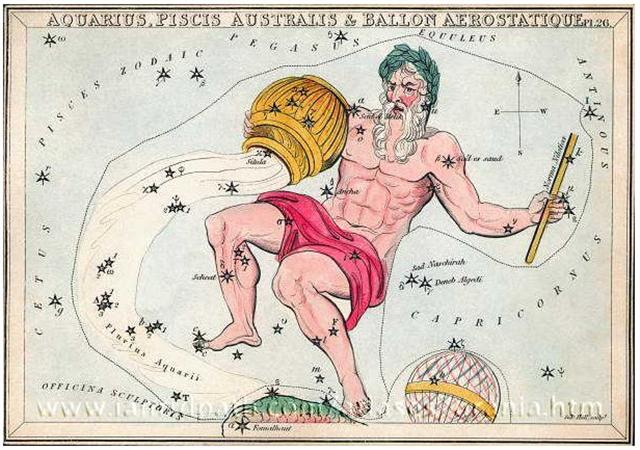 |
The measure
used for the Moon calendar was evidently 230 (Ca9-2)
- 156 (Ca6-16) = 74 right ascension days (i.e. 1/10
of the total number of glyphs on the tablet):
|
tupu
te ure o te henua |
erua
kiore |
Te
marama erua |
|
Ure.
1.
Generation; ure matá,
warlike, bellicose
generation (matá,
obsidian, used in making
weapons). 2. Offspring;
brother; colleague i
toou ure ka tata-mai,
your colleague has
turned up. 3.
Friendship, friendly
relationship; ku-ké-á
te ure, they have
become enemies (lit.:
friendship has changed).
4. Penis (this
definition is found in
Englert's 1938
dictionary, but not in
La Tierra de Hotu
Matu'a). Ure
tahiri, to gush, to
spurt, to flow; e-ure
tahiri-á te toto,
blood is flowing in
gushes. Ure tiatia
moana, whirlwind
which descend quickly
and violently onto the
ocean; whirlpool, eddy.
Vanaga. Penis; kiri
ure, prepuce,
foreskin. P Pau., Mgv.,
Ta.: ure, penis.
Ureure, spiral.
Ta.: aureure, id.
Urei, to show the
teeth. Mgv.: urei,
to uncover the eye by
rolling back the lids.
Churchill. Pau.:
Ureuretiamoana,
waterspout. Ta.:
ureuretumoana, id.
Churchill. H. Ule
1. Penis. For
imaginative compounds
see 'a'awa 1,
'aweule, ulehala,
ulehole,
ulepa'a, ulepuaa,
ule'ulu. Kū ka
ule, he'e ka laho,
the penis is upright,
the scrotum runs away
(refers to breadfruit:
when the blossom,
pōule, appears
erect, there will soon
be fruit). 2. Tenon for
a mortise; pointed end
of a post which enters
the crotch of a rafter
(also called ma'i
kāne). Ho'o ule,
to form a tenon or post
for the crotch of a
rafter. 3. To hang.
Wehewehe. |
 |
 |
 |
 |
 |
|
Ca8-27 (156 + 70) |
Ca8-28 |
Ca8-29 (392 + 228 = 620) |
Ca9-1 |
Ca9-2 (230) |
|
CLOSE TO THE FULL MOON: |
|
'Oct 6 (209 + 70) |
7 (280) |
8 |
9 |
10 |
|
Nov 2 (236 + 70)
KE KWAN (Cavalry
Officer) =
β
Lupi
(226.3),
KE KWAN =
κ
Centauri (226.4),
ZUBEN ELAKRIBI (Claw of
the Scorpion) =
δ
Librae
(226.8),
π¹
Oct.
(226.9)
*185.0 = *226.4 - 41.4 |
3
ω Bootis (227.2),
NEKKAR (Herdsman) = β
Bootis
(227.3), σ Librae
(227.5), π² Oct.
(227.7),
NADLAT (Mean Little
Ones) = ψ Bootis
(227.8), π Lupi (227.9) |
4 (125 + 183 = 308)
15h (228.3)
ZUBEN HAKRABIM = ν
Librae
(228.3), λ Lupi (228.9) |
5
ω
Oct. (229.3),
ι
Librae (229.6),
κ
Lupi (229.7),
ζ
Lupi (229.8) |
6 (310)
Al Zubānā-14b (Claws)
χ
Bootis (230.3),
PRINCEPS =
δ
Bootis
(230.6),
ZUBEN ELSCHEMALI
(Northern Claw) =
β
Librae
(230.8) |
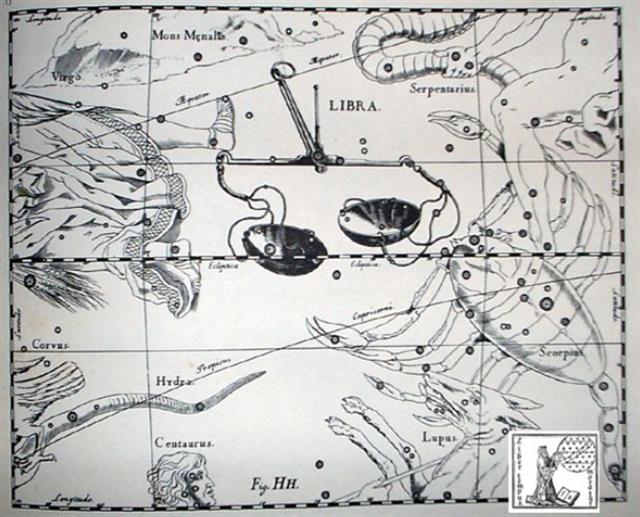 |
|
CLOSE TO THE SUN: |
|
May 3
ρ
Arietis (43.0),
GORGONEA SECUNDA =
π
Persei
(43.5),
ACAMAR (End of the
River) =
θ
Eridani
(43.6),
ε
Arietis (43.7),
λ
Ceti (43.9)
DENEBOLA (β Leonis) |
4
MENKAR (The Nose) =
α
Ceti
(44.7) |
5 (125)
3h (45.7)
GORGONEA TERTIA =
ρ
Persei
(45.1),
ALGOL (The Demon) =
β
Persei
(45.9) |
6
ι
Persei (46.1),
MISAM (Next to the
Pleiades) =
κ
Persei
(46.2),
GORGONEA QUARTA =
ω
Persei
(46.7),
BOTEIN (Pair of Bellies)
=
δ
Arietis
(46.9) |
7
ζ Arietis (47.7) |
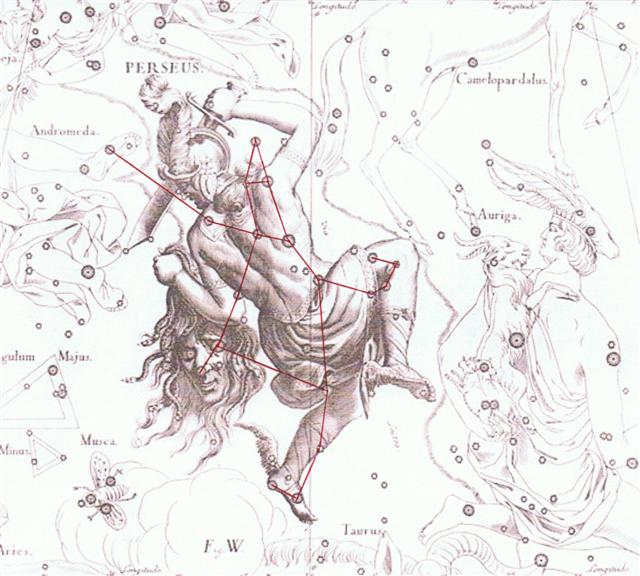 |
This leaves 740 -
74 = 666 days for the rest of
the text - i.e. the number of
the Beast:
... The Beast is a figure in the
Book of Revelation, the last
book of the New Testament
describing an elaborate
metaphor. The Beast is an animal
with seven heads coming out of a
sea who makes himself an enemy
of the Christian Church
...
The Number of the Beast is
described in the Book of
Revelation 13:18.
From the King James translation:
Here is wisdom. Let him that
hath understanding count the
number of the beast: for it is
the number of a man; and his
number is Six hundred threescore
and six ...
... 666 is an abundant number.
It is the sum of the first 36
natural numbers (i.e.
1 + 2 + 3
+ ... + 34 + 35 + 36 = 666),
and thus a triangular number.
Since 36 is both square and
triangular, 666 is the sixth
number of the form
n²(n²
+ 1) / 2 ...and the
eighth number of the form
n(n
+ 1)(n²+
n + 2) / 8
...
666 is the sum of the squares of
the first seven prime numbers
(i.e. 2²
+ 3²
+ 5²
+ 7²
+ 11²
+ 13²
+ 17²
= 666)
...The
Roman numeral representation of
the number 666 (DCLXVI) uses
once each the Roman numeral
symbols with values under 1,000,
occurring in descending order of
their respective values (D =
500, C = 100, L = 50, X = 10, V
= 5, I = 1)
...
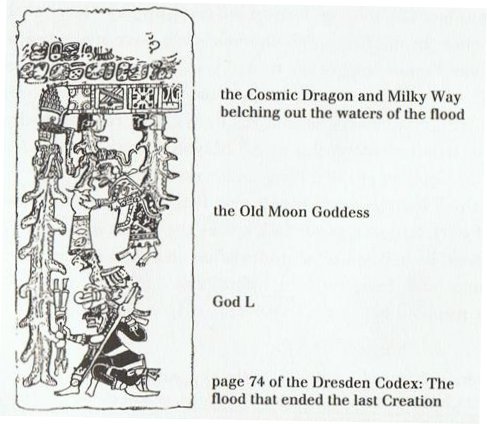
... Here the
'belching out of the waters of
the flood' occurs at left, and
north of the equator east lies
at left.
South of the
equator east lies at right:
 |
 |
 |
 |
 |
 |
 |
|
Aa6-64 (480) |
Aa6-65 |
Aa6-66 |
Aa6-67 |
Aa6-68 |
Aa6-69 |
Aa6-70 |
|
i to
moa |
ko te
vai hopu o te moa |
e he
goe kua moe |
ki to
vaha o to ika mea |
o te
maitaki |
kua
noho te ariki |
e mago |
|
To.
1.
Particle sometimes used
with the article in
ancient legends; i
uto to te hau, the
ribbon was in the float.
2. To rise (of the sun)
during the morning hours
up to the zenith:
he-to te raá.
Vanaga. 1. Of. T Pau.,
Ta.: to, of.
Mgv.: to,
genitive sign. Mq.:
to, of, for. 2.
This, which. Churchill.
Mgv.: To, to make
a canoe of planks. Mq.:
to, to build a
canoe. Sa.: to,
to build. Churchill.
Hopu.
1. To
wash oneself, to
bathe, 2. Aid,
helper, in the following expressions: hopu kupega, those who help
the motuha o te hopu
kupega in handling
the fishing nets;
hopu manu, those who
served the tagata
manu and, upon
finding the first
manutara egg, took
it to Orongo.
Vanaga. Bath; to bathe,
to cleanse (hoopu).
Pau.: hopu, bath;
to bathe. Ta.: hopu,
to dive. Churchill. Mq.:
hopu, to embrace,
to clasp about the body.
Ma.: hopu, to
catch, to seize.
Churchill.
Goe.
Milky
Way. Vanaga. |
 |
 |
 |
 |
 |
 |
|
Aa6-71 |
Aa6-72 |
Aa6-73 (490) |
Aa6-74 |
Aa6-75 |
Aa6-76 |
|
e moa
te ika hagai i te ariki |
o to
ua |
ko te
kai hagai o te ariki |
ma to
ua |
mae
tae tagi te vai |
tagi
hoti mai ai i te vai |
The ua
sign in Aa6-66 maybe is to be
read as the flood which ends the
last creation = the 1st half
year.
Maybe the
water carrier (Aquarius) is the
god who definitely kills the old
sun (the last 'creation' in an
indefinite series of 'suns').
The number 666 of Aa6-66 is the
number of the beast and 1334
(the number of glyphs on the
Tahua tablet) = 666 + 668.
The 'beast' may be the strange
creature which extinguishes the
old fire, the Cosmic Dragon
according to Maya
...
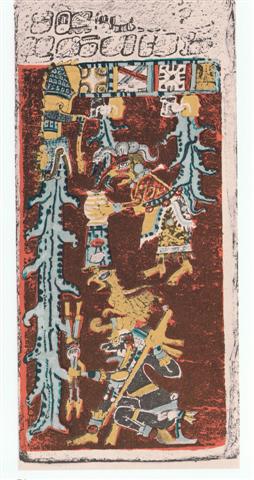
... His
temple-palace was composed of
four radiant apartments: one
toward the east, yellow with
gold; one towards the west, blue
with turquoise and jade; one
toward the south, white with
pearls and shells; one towards
the north, red with bloodstones
- symbolizing the cardinal
quarters of the world over which
the light of the sun holds
sway. And it was set wonderfully
above a mighty river that passed
through the midst of the city of
Tula;
so that every night, precisely
at midnight, the king descended
into the river to bathe; and the
place of his bath was called 'In
the Painted Vase', or 'In the
Precious Waters'
...
... In China, with Capricornus,
Pisces, and a part of
Sagittarius, it [Aquarius]
constituted the early Serpent,
or Turtle, Tien Yuen; and
later was known as Hiuen Ying,
the Dark Warrior and Hero
[Homan], or Darkly Flourishing
One, the Hiuen Wu, or
Hiuen Heaou, of the Han
dynasty, which Dupuis gave as
Hiven Mao. It was a symbol
of the emperor Tchoun Hin,
in whose reign was a great
deluge; but after the Jesuits
came in it became Paou Ping,
the Precious Vase. It contained
three of the sieu, and headed
the list of zodiac signs as the
Rat, which in the far
East was the ideograph for
'water', and still so remains in
the almanacs of Central Asia,
Cochin China, and Japan ...
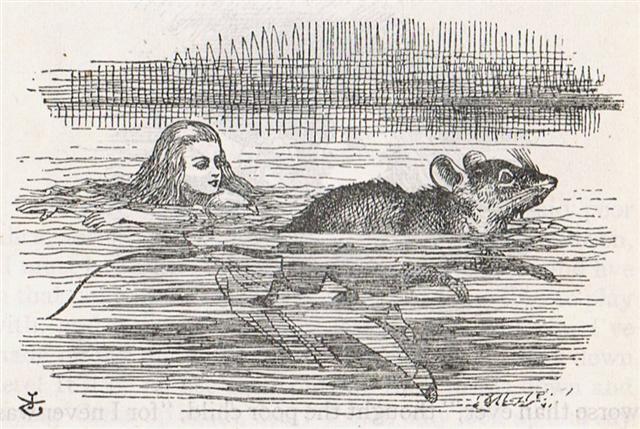
|
















